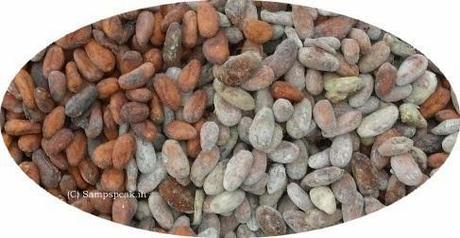 Republic of Ghana, located in Gulf of Guinea and Atlantic Ocean,
in West Africa is famous for cocoa beans.
A Govt Organisation there controls the pricing, procuring and export of
cocoa beans from Ghana. There is also
Hot chocolate (known as hot cocoa), a heated beverage typically consisting of
shaved chocolate, melted chocolate or cocoa powder, heated milk or water, and
sugar ~ the prices of cocoa pods are likely to go up, eventually making your
chocolates dearer……… the reason … read on !!
Facebook CEO Mark
Zuckerberg and his wife, Priscilla Chan, are donating $25 million to the CDC
Foundation to help address the Ebola epidemic. The money will be used by the US
Centers for Disease Control and Prevention's Ebola response effort in Guinea,
Liberia and Sierra Leone and elsewhere in the world where Ebola is a threat,
the foundation said. The grant follows a $9 million donation made by Microsoft
co-founder Paul Allen last month. Also
on Tuesday, the World Health Organization said West Africa could see up to
10,000 new Ebola cases a week within two months and confirmed that the death
rate in the current outbreak is now 70 percent. The disease has killed more than
4,000 people, nearly all of them in West Africa. The WHO has called the
outbreak "the most severe, acute health emergency seen in modern
times."
Cocoa is the chief agricultural export of Ghana and the country's main
cash crop. Behind Ivory Coast, Ghana is the second largest cocoa exporter in
the world. Ghana’s cocoa harvest, the world’s second-biggest, will meet the
government’s forecast for crops close to or at a record amid favorable rains,
according to the meteorological agency. The West African nation
is “confident” the 2014-15 harvest will exceed 1 million metric tons, Chief
executive officer of the Ghana Cocoa Board, said last week. The nation raised farm gate prices 63 percent
to 5,520 cedis ($1,714) a ton this month to curb smuggling to neighbouring Ivory
Coast, the largest producer.
The Guardian reports that
when the cedi depreciates and cocoa
prices stagnate, illicit trading in neighbouring Ivory Coast rises. As is with farmers in many countries, Ghana
farmers also feel that though they have been the backbone of the country’s
economy, their lives have not been transformed.
It appears that Ghana, hailed until recently for its strong economic
growth, is now struggling, which led to demonstrations in the capital Accra last
month over government corruption and the depreciating worth of the cedi, which
has lost as much as 40% of its value against the dollar. Ghana’s economic woes
have hurt farmers, who say basic operational costs, including the price of
fertiliser, have risen sharply over the past three years. Despite this, Cocobod
has not increased the price it pays for cocoa – farmers still receive 212 cedis
(£36.63) for a 64kg bag.
Ghana’s ruling National Democratic Congress party said in its manifesto that
Cocobod would “strive to pay the cocoa farmer at least 70% of the world market
price of cocoa”, as well as cover the cost of pest control, and improving roads
and production methods. The board says fertilizer is free for farmers but there
are farmers who are not covered by this programme. Under Ghanaian law, farmers are only allowed
to sell their beans to purchasing clerks who act as intermediaries between them
and Cocobod. In recent months anti-smuggling taskforce has boosted its efforts
to curb illegal cross-border trading. Still there is problem for the Ghana
cocoa farmer.
More than the economic
reasons, the much feared epidemic - Ebola outbreak is set to make the price of
chocolate soar after huge rise in cost of cocoa beans. There has been growing demand from countries
like China whose consumers are fast developing Western-style tastes for
chocolate that they never used to have.
According to Daily Mail, experts warn that Chocolate prices could soar
by up to 20 per cent as a result of the Ebola outbreak in Africa. Manufacturers of chocolate will decide how
much of the price hike they pass on to the consumer, but it is inevitable that
prices of products on shop shelves in Britain and elsewhere will rise. The problem is the fear factor,
according to analysts as the crop is good, supply is high and the countries
which produce most of the world's beans have not been hit by Ebola.
Republic of Ghana, located in Gulf of Guinea and Atlantic Ocean,
in West Africa is famous for cocoa beans.
A Govt Organisation there controls the pricing, procuring and export of
cocoa beans from Ghana. There is also
Hot chocolate (known as hot cocoa), a heated beverage typically consisting of
shaved chocolate, melted chocolate or cocoa powder, heated milk or water, and
sugar ~ the prices of cocoa pods are likely to go up, eventually making your
chocolates dearer……… the reason … read on !!
Facebook CEO Mark
Zuckerberg and his wife, Priscilla Chan, are donating $25 million to the CDC
Foundation to help address the Ebola epidemic. The money will be used by the US
Centers for Disease Control and Prevention's Ebola response effort in Guinea,
Liberia and Sierra Leone and elsewhere in the world where Ebola is a threat,
the foundation said. The grant follows a $9 million donation made by Microsoft
co-founder Paul Allen last month. Also
on Tuesday, the World Health Organization said West Africa could see up to
10,000 new Ebola cases a week within two months and confirmed that the death
rate in the current outbreak is now 70 percent. The disease has killed more than
4,000 people, nearly all of them in West Africa. The WHO has called the
outbreak "the most severe, acute health emergency seen in modern
times."
Cocoa is the chief agricultural export of Ghana and the country's main
cash crop. Behind Ivory Coast, Ghana is the second largest cocoa exporter in
the world. Ghana’s cocoa harvest, the world’s second-biggest, will meet the
government’s forecast for crops close to or at a record amid favorable rains,
according to the meteorological agency. The West African nation
is “confident” the 2014-15 harvest will exceed 1 million metric tons, Chief
executive officer of the Ghana Cocoa Board, said last week. The nation raised farm gate prices 63 percent
to 5,520 cedis ($1,714) a ton this month to curb smuggling to neighbouring Ivory
Coast, the largest producer.
The Guardian reports that
when the cedi depreciates and cocoa
prices stagnate, illicit trading in neighbouring Ivory Coast rises. As is with farmers in many countries, Ghana
farmers also feel that though they have been the backbone of the country’s
economy, their lives have not been transformed.
It appears that Ghana, hailed until recently for its strong economic
growth, is now struggling, which led to demonstrations in the capital Accra last
month over government corruption and the depreciating worth of the cedi, which
has lost as much as 40% of its value against the dollar. Ghana’s economic woes
have hurt farmers, who say basic operational costs, including the price of
fertiliser, have risen sharply over the past three years. Despite this, Cocobod
has not increased the price it pays for cocoa – farmers still receive 212 cedis
(£36.63) for a 64kg bag.
Ghana’s ruling National Democratic Congress party said in its manifesto that
Cocobod would “strive to pay the cocoa farmer at least 70% of the world market
price of cocoa”, as well as cover the cost of pest control, and improving roads
and production methods. The board says fertilizer is free for farmers but there
are farmers who are not covered by this programme. Under Ghanaian law, farmers are only allowed
to sell their beans to purchasing clerks who act as intermediaries between them
and Cocobod. In recent months anti-smuggling taskforce has boosted its efforts
to curb illegal cross-border trading. Still there is problem for the Ghana
cocoa farmer.
More than the economic
reasons, the much feared epidemic - Ebola outbreak is set to make the price of
chocolate soar after huge rise in cost of cocoa beans. There has been growing demand from countries
like China whose consumers are fast developing Western-style tastes for
chocolate that they never used to have.
According to Daily Mail, experts warn that Chocolate prices could soar
by up to 20 per cent as a result of the Ebola outbreak in Africa. Manufacturers of chocolate will decide how
much of the price hike they pass on to the consumer, but it is inevitable that
prices of products on shop shelves in Britain and elsewhere will rise. The problem is the fear factor,
according to analysts as the crop is good, supply is high and the countries
which produce most of the world's beans have not been hit by Ebola.
 But these nations - Ghana
and Ivory Coast mainly - do have borders with countries like Liberia where most
of the 4,000 deaths to date have been recorded, said analysts Mintec. This affects transportation links in the area,
migrant workers from disease affected countries but, mainly, the fear that
Ebola could spread to cocoa producing nations. With the main harvest in
progress, concerns have risen that the spread of Ebola will disrupt ban
shipments as West African regions have already seen some transportation
disruption. West African countries supply around three quarters of the world's
cocoa for chocolate production and for them it is also their major export. It
means the crisis could affect hundreds of thousands of livelihoods in the
region.
~ and that is
not sweet news for sweettooths.
With regards – S.
Sampathkumar
But these nations - Ghana
and Ivory Coast mainly - do have borders with countries like Liberia where most
of the 4,000 deaths to date have been recorded, said analysts Mintec. This affects transportation links in the area,
migrant workers from disease affected countries but, mainly, the fear that
Ebola could spread to cocoa producing nations. With the main harvest in
progress, concerns have risen that the spread of Ebola will disrupt ban
shipments as West African regions have already seen some transportation
disruption. West African countries supply around three quarters of the world's
cocoa for chocolate production and for them it is also their major export. It
means the crisis could affect hundreds of thousands of livelihoods in the
region.
~ and that is
not sweet news for sweettooths.
With regards – S.
Sampathkumar
15th Oct 2014.

